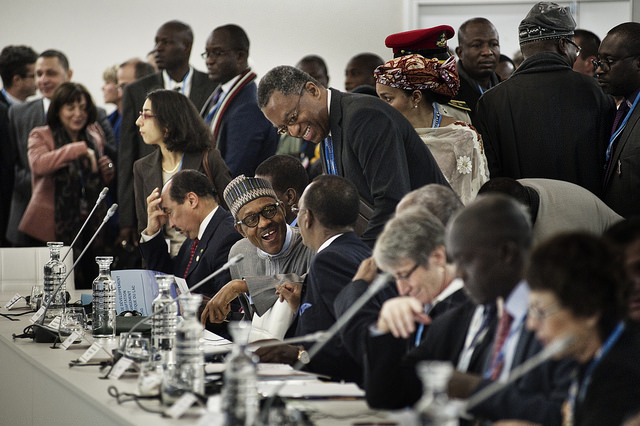
The Coalition of African civil society organisations under the aegis of Pan African Climate Justice Alliance (PACJA) has welcomed France’s €2 billion pledge in support of renewable energy in Africa by 2020 but insists that “it is merely a drop in the ocean” as the ecological debt that the world needs to pay back to Africa is far more that.
PACJA’s Mithika Mwenda made this known at the sidelines of the ongoing Paris climate talks which is presently tottering on the brinks of collapse over deliberate negotiation hurdles placed by United States and Norway, disagreements on the place of differentiation and climate finance in the planned climate deal.
It may be recalled that President of the French Republic, François Hollande, at the Climate Challenge and African Solutions” on Tuesday promised €2 billion by 2020 for renewable energy in Africa.
“France wants to set an example” and show that it does not simply “support African forces” as in Mali and the Central African Republic, said the French President before his African counterparts.,
The summit brought together twelve African Heads of State, the Chairperson of the African Union Commission, and representatives of several governments and international institutions including World Bank and African Development Bank to discusse solutions to three considerable challenges: access to renewable energy, combating desertification, and preserving Lake Chad.
The €2 billion promised for renewable energy will represent a “50% increase on the last five years”, indicated the French President. Africa will also receive “a very substantial part” of the overall financial effort made by France to combat global warming, which should itself be increased from €3 billion to €5 billion euros per year by 2020, said François Hollande.
Hollande agreed with climate justice activists that “there is an ecological debt that the world needs to pay back to Africa” as the continent is being hit hard by the consequences of global warming, yet it is responsible for only 4% of global greenhouse gas emissions. said the French President.
The African Union Chairperson, Nkosazana Dlamini-Zuma also lent her voice to the debate and called for an “ambitious agreement” as the outcome of COP21, and for acknowledgement of a differentiated responsibility that takes into account the capabilities of all, including developed and emerging countries.
Erecting a “Great Green Wall”
The situation of Africa, said the Guinean President, Alpha Condé, requires not just “generalities” but “concrete proposals” from the international community. “We want a precise budget for hydroelectric dams”, he insisted.
“We need to leave Paris knowing, concretely, what the international community will put into projects” implemented by Africa, underlined the Senegalese President, Macky Sall.
Amongst other initiatives, Africa is trying to erect a “Great Green Wall” from Senegal to Djibouti, a green barrier aimed at containing the spread of the desert. The neighbouring States of Lake Chad are envisaging the diversion of water from the Ubangi River to help restore the lake’s water levels.
“It is time to save Lake Chad [the area of which has fallen from 25,000 km² in the 1960s to 2500 km² today], and financial commitments need to be made at this table”, insisted President Sall.
For these projects to “adapt” to the consequences of global warming, France will “gradually triple its bilateral commitments in Africa, to reach €1 billion per year in 2020”, promised the Presidency.
“I saw before my eyes the River Niger disappear into the sands”, reported Malian President Ibrahim Boubacar Keita. Above and beyond the damage to the planet, climate change has “disastrous consequences for its inhabitants”, emphasized the President of Mauritania, Mohamed Ould Abdel Aziz, who mentioned poverty and destroyed crops.
Mahamadou Issoufou of Niger highlighted the “close links between the drying-up of Lake Chad and terrorism in the region”, where Boko Haram is wreaking havoc. He mentioned the “convoy of refugees and displaced persons” – about 5 million, according to Nigeria – linked to these two scourges, and called for action “quickly, quickly, before it is too late.”










